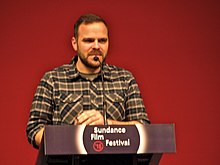Kyle Patrick Alvarez
This article, Kyle Patrick Alvarez, has recently been created via the Articles for creation process. Please check to see if the reviewer has accidentally left this template after accepting the draft and take appropriate action as necessary.
Reviewer tools: Inform author |
 Comment: Leaving this to another reviewer. Robert McClenon (talk) 02:07, 27 May 2018 (UTC)
Comment: Leaving this to another reviewer. Robert McClenon (talk) 02:07, 27 May 2018 (UTC)

Kyle Patrick Alvarez is an American film director and screenwriter.
Alvarez was born in Miami, and attended the University of Miami.[1] His first film, Easier with Practice (2009), was based on a GQ article by Davy Rothbart.[2] Alvarez then adapted a short story by David Sedaris into the film C.O.G., which premiered at the 2013 Sundance Film Festival, and was released later that year.
Alvarez's third film, The Stanford Prison Experiment, a thriller dramatizing the 1971 experiment of the same name, premiered at the 2015 Sundance Film Festival, where it received the Alfred P. Sloan Prize.[3] It received positive reviews and was distributed by IFC Films.[4] Alvarez has also directed four episodes of the Netflix series 13 Reasons Why.[5]
Alvarez lives in Los Angeles.[1] He is openly gay.[6]
References
- ^ a b Olsen, Mark (February 28, 2010). "Kyle Patrick Alvarez's 'Easier With Practice' finds its way to screens". Los Angeles Times. Retrieved May 26, 2018.
- ^ Barnes, Brooks (January 19, 2013). "A Writer's Strange Route to Hollywood". The New York Times. Retrieved May 26, 2018.
- ^ "MAKING THE STANFORD PRISON EXPERIMENT: An Interview with Kyle Patrick Alvarez". Lunacy Productions. November 28, 2017. Retrieved May 26, 2018.
- ^ "The Stanford Prison Experiment (2015)". Rotten Tomatoes. Retrieved November 19, 2017.
- ^ Busis, Hillary (May 5, 2017). "How 13 Reasons Why Built That Heartbreaking Suicide Scene". Vanity Fair. Retrieved May 26, 2018.
- ^ Kramer, Gary M. (2013). "Openly Gay Writer/Director Kyle Patrick Alvarez Talks About His Latest Film: C.O.G." San Francisco Bay Times. Retrieved May 26, 2018.

